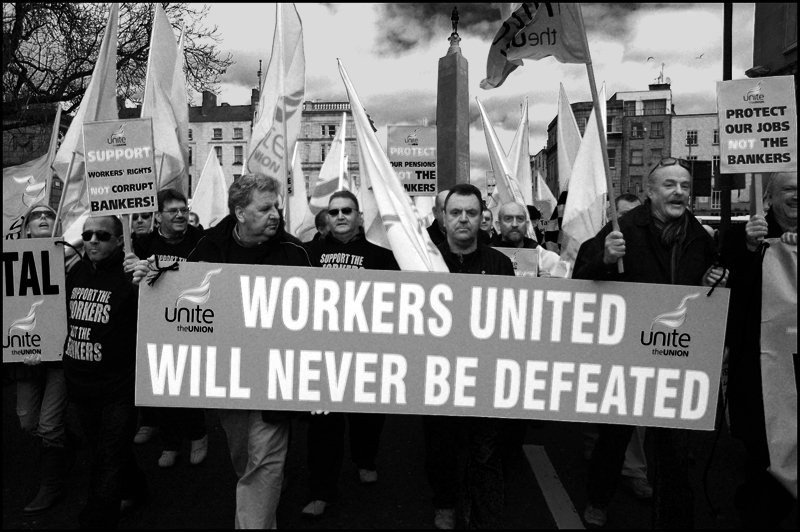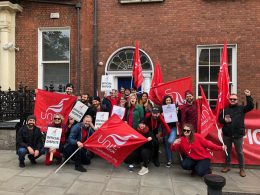
by Kevin McLoughlin
WATERFORD CRYSTAL: Specially hired security individually delivered letters saying that from the following Monday there was no need to report for work, as the world-renowned Waterford Crystal factory would be closed!
Shocked but bitterly angry that the receiver had decided to end production, workers at Waterford Crystal made their way to the Visitors Centre. There, more hired security blocked their way, apparently some claiming to have baseball bats. If they thought such intimidation would crush the workers’ anger, they were sorely mistaken. Hundreds of workers brushed the heavies aside. So began the occupation at the Waterford Crystal on Friday 30 January.
The workers had no option but to occupy. More than 700 workers are employed at Waterford Crystal, with roughly 500 in the manufacture of glass crystal homeware products. If the receiver was allowed to just close the facility, their entitlements and future would have been dismantled at a stroke.
Seven hundred jobs are directly at stake, indirectly there are many more. Closure would also have meant that the companies that had been circling Waterford Crystal would be able to swoop in and substantially reduced wages and conditions for whatever workforce they took back.
With ongoing financial problems in the company, a significant number of workers were prepared to take redundancy. In previous packages such long-term workers would have gotten up to ?150,000 in redundancy. Now, with bankruptcy, all they would get would be a basic statutory payment. Defence of pensions was also a crucial motivator for the workers’ action.
So Waterford Crystal workers had no choice but to occupy and take effective control of the plant and equipment as the means of fighting for their rights. That conclusion was drawn extremely quickly and reflected what was at stake but also that the militant and left traditions amongst the Glass workers, like the furnace at the plant, had not been extinguished.
Business failures in Ireland doubled last year. This year is expected to be much worse, with some estimates saying more than a third of all businesses are insolvent. With what happened at Waterford Crystal likely to be visited on many more workers, the struggle in Waterford is extremely important.
Waterford Glass was first established in 1783. This year Wedgwood would have been celebrating its 250th anniversary in Stoke-on-Trent. The companies came together in 1986 when Waterford bought Wedgwood for ?323 million in today’s money.
Within a few years of coming together, however, their combined value was at less than what Waterford had paid for Wedgwood. Debts dating back to that time have been critical in crippling the company. Despite carrying debts, boss Tony O’Reilly continued to collect trophies, adding more renowned homeware brands to Waterford, such as Royal Doulton and Rosenthal porcelain in Germany and All-Clad Metalcrafters in the US.
Waterford Wedgwood employed more than 8,000 people internationally. Its debts amounted to ?450 million, roughly half the value of yearly sales. At the start of this year, Bank of America appointed a receiver to some of the companies, most notably the plant in Waterford and the Wedgwood factory in Stoke-on-Trent, but other parts of the company, employing 5,000, are still operating.
The workers at Waterford and Stoke-on-Trent are paying the price for the financial instability, economic crisis and gross mismanagement. The indications are that, if debts repayments are removed, the plant in Waterford is profitable and was actually growing its share in the key US market.
When you go to the Visitors Centre, to the right of the entrance a UNITE banner reads, “Nationalise Waterford Crystal”. When you go inside the plant, now under workers’control, you see that everything is very orderly, the workers welcome all support warmly and you are besieged to take tea, coffee, sandwiches or even some ice cream.
You get a glimpse of the profound capabilities and power of working people. What they are doing, according to the law, is illegal but as another banner says, “The workers united will never be defeated”. The state would be incapable of removing them such is their determination and support in the community. Waterford is a demonstration that with well-organised action and support in the working class, you can push aside anti-trade union laws and the state.
With the workers in occupation, UNITE should have immediately launched a campaign for nationalisation which clearly some of the workers’ support. However, the fact that the union leadership has focused exclusively on finding a private buyer, says they don’t think nationalisation is an option.
The workers trust the union officials, who are former glass workers, and accept the focus of trying to find a private buyer, hoping that the issues will somehow be resolved. But clearly there is also unease and fear of what that approach will achieve. As one worker quoted in the Waterford News & Star said, “Either way we are going to be beaten but with a softer stick if Clarion takes over.”
The reference is to private equity company Clarion Capital, which is the preferred option of the union. But even the most optimistic projections are that if Clarion takes over with significant state financial assistance, only 300 jobs may be saved and pay and conditions will be substantially diminished. Any privateer will also try to avoid any responsibility for the pensions and redundancy deficits.
It is possible that the conditions the likes of Clarion may offer on employment, redundancy or pensions payments will not be acceptable to the workers. Any attempts to try to divide the workers and force through a deal must be resisted.
But it is not a choice of which defeat is better. Nationalisation is not a never never afterthought to be pondered if no private buyer can be found. The arguments for nationalisation of Waterford Crystal are very strong. The company is viable and therefore no argument can be made as to why 400 jobs should be lost.
If Clarion were to take it over and even guarantee to keep the plant for a couple of years, it is most likely they will pull out soon afterward, possibly leaving a Visitors Centre, a shop and just enough manufacturing jobs to supply the shop.
The 700 jobs should be fought for. Workers taking redundancy should be replaced by new workers and the pay and conditions, won over years of struggle, should also be defended. Nationalisation, under the democratic control and management of working people, is the only way a real future for Waterford Crystal and its workers can be guaranteed.
Any idea that nationalisation is not possible is being shown by events to be wrong. The government is now finalising its ?7 billion bail out of Allied Irish Bank and Bank of Ireland. They have just nationalised Anglo Irish Bank! A campaign to demand that the state intervene and invest to defend Waterford Crystal and the economy of the southeast through nationalisation, would get a huge public response.
UNITE should seize this opportunity. By waging a struggle for nationalisation they would be defending the working class of Waterford but also could transform the debate that is going on about how the economic crisis should be dealt with. All we hear is propaganda for a social solidarity pact, where ordinary people bail out the state and the rich.
A struggle for the nationalisation of Waterford Crystal could be the start of a new movement which puts the focus on the need for the state to use the wealth and economic resources to defend jobs and people’s livelihoods, instead of bailing out big business and the rich.










